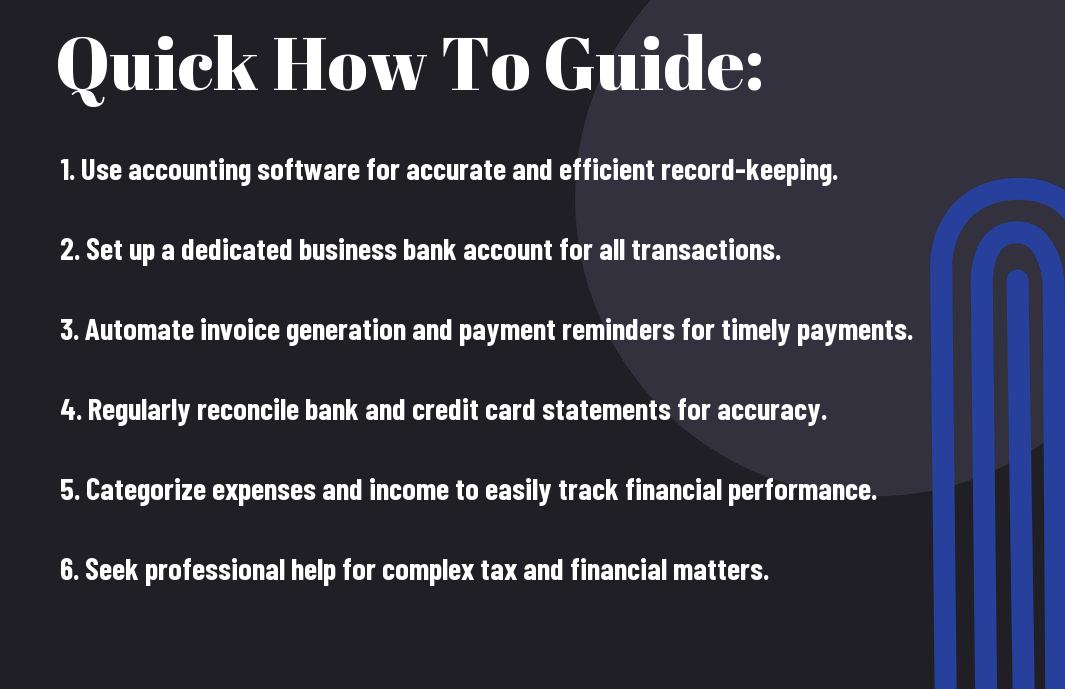How to Streamline Small Business Bookkeeping for Improved Financial Health
Do you find yourself struggling to maintain efficient and accurate bookkeeping for your small business? It’s important to recognize the critical role that proper bookkeeping plays in the financial health of your business. By taking steps to streamline your bookkeeping processes, you can drastically improve your financial situation and make informed decisions to drive your business forward.
First and foremost, you need to implement a reliable accounting software that can automate repetitive tasks and organize your financial data. This will not only save you time, but also reduce the risk of errors. Additionally, make sure to separate your personal and business finances to avoid any confusion when it comes to managing your books. Lastly, regularly reconcile your accounts to detect any discrepancies and address them promptly. By following these tips, you can streamline your small business bookkeeping and pave the way for improved financial health.
Key Takeaways:
- Automate bookkeeping processes: By leveraging accounting software and cloud-based solutions, small businesses can simplify their bookkeeping tasks and reduce the chances of human errors.
- Regularly reconcile accounts: Reconciling bank statements, credit card transactions, and accounts payable/receivable on a monthly basis helps maintain accurate financial records and prevents discrepancies.
- Seek professional guidance: Consult with a finance professional or bookkeeper to streamline bookkeeping processes, gain valuable insights into financial health, and ensure compliance with tax regulations.

Establishing a Solid Bookkeeping Foundation
One of the most important steps in streamlining your small business bookkeeping is establishing a solid foundation. This includes choosing the right bookkeeping software and setting up your chart of accounts. These foundational elements will set the stage for effective bookkeeping practices and improved financial health for your business.
Choosing the Right Bookkeeping Software
When it comes to choosing the right bookkeeping software for your small business, you have several options to consider. Look for software that is user-friendly, scalable, and offers the features you need to effectively track your finances. Consider the size and complexity of your business, as well as your budget, when making your decision. It’s important to choose a software that integrates with your other business systems and provides the level of reporting and analysis you require. Additionally, look for a solution that offers regular updates and support to ensure the software remains current and effective for your needs.
Setting Up Your Chart of Accounts
Your chart of accounts is the backbone of your bookkeeping system, providing a framework for organizing and categorizing your financial transactions. When setting up your chart of accounts, you need to ensure that it accurately reflects your business’s financial activities. This involves creating categories for income, expenses, assets, liabilities, and equity. Accurately categorizing your transactions will help you gain a clear understanding of your business’s financial position and performance. It’s important to take the time to set up your chart of accounts correctly from the start, as making changes later can be time-consuming and lead to inaccuracies in your financial reporting. Once your chart of accounts is established, regularly review it to ensure it continues to meet the needs of your growing business.

Daily Bookkeeping Habits
Your daily bookkeeping habits can make or break the financial health of your small business. By developing a routine that includes regular transaction recording and account reconciliation, you can ensure that your books are always up to date and accurate. This will provide you with a clear and current picture of your business’s financial standing, allowing you to make informed decisions and identify potential issues before they become significant problems.
How to Simplify Transaction Recording
When it comes to recording transactions, the key is to keep it simple and consistent. Designate a specific time each day to input all incoming and outgoing transactions into your accounting system. This will prevent any transactions from slipping through the cracks and ensure that your records are always current. Additionally, consider using accounting software that offers automation features, such as bank feed integration, to streamline the process and minimize manual data entry errors. By simplifying transaction recording, you can maintain accurate financial records with minimal effort.
Reconciling Accounts Regularly
Regularly reconciling your accounts is essential for spotting discrepancies and ensuring the accuracy of your financial records. Set aside time each week to compare your bank and credit card statements to your accounting records, identifying any discrepancies and reconciling them promptly. This practice will help you catch errors, unauthorized charges, and potential fraud early, protecting your business from financial loss or damage to your reputation. It also provides peace of mind that your financial data is accurate, giving you a clear view of your business’s financial health and performance.
Managing Accounts Receivable
For small business owners, managing accounts receivable is crucial for maintaining a healthy cash flow and ensuring timely payments from customers. By implementing efficient processes for invoice creation and tracking, as well as adopting strategies to improve cash flow, you can streamline your bookkeeping and improve your financial health.
Invoice Creation and Tracking
One of the first steps in managing accounts receivable is to create and send out accurate and timely invoices to your customers. Make sure to include all necessary details such as the description of the products or services provided, payment terms, and due dates.
It’s essential to track your invoices to ensure that payments are received on time. Set up a system to monitor invoice status, send reminders for overdue payments, and follow up with customers who have outstanding balances. Your proactive approach to invoice tracking can help you maintain a steady cash flow.
Strategies to Improve Cash Flow
Improving your cash flow is essential for the financial health of your small business. One effective strategy is to offer incentives for early payments, such as discounts for customers who settle their invoices before the due date. This can encourage prompt payment and help you maintain a positive cash flow.
Another strategy to improve cash flow is to establish clear and enforceable payment terms with your customers. Clearly communicate your expectations regarding payment due dates and consequences for late payments. By doing so, you can minimize the risk of overdue accounts and maintain a steady stream of revenue for your business.
Handling Accounts Payable Efficiently
Keep your small business’s accounts payable process running smoothly by paying close attention to how you handle your expenses. Effectively managing your outgoing payments is essential for maintaining the financial health of your business. In this chapter, we will explore how you can handle accounts payable efficiently to keep your small business in good standing.
How to Streamline Bill Payments
When it comes to handling bill payments, streamlining the process can save you time and prevent unnecessary stress. Set up a regular schedule for reviewing and paying bills, and consider automating payments to ensure they are made on time. Additionally, use accounting software to keep track of all incoming invoices and their due dates. This will allow you to easily see what needs to be paid and when, helping you stay on top of your financial obligations.
Tips for Optimizing Expense Management
Optimizing your business’s expense management can have a significant impact on your financial health. Implement a system for categorizing and documenting expenses, making it easier to track where your money is going. Utilize expense management tools and software that can automate processes and provide you with valuable insights into your spending habits. Look for ways to cut unnecessary expenses and negotiate better terms with vendors to reduce your overhead costs. By keeping a close eye on your expenses, you can make informed decisions that will positively impact your bottom line.
- Keep detailed records of all expenses to maintain accuracy
- Use accounting software to automate and streamline expense management
- Regularly review and assess your expenses to identify areas for improvement
Through careful expense management, you can identify opportunities to increase profitability and ensure that every dollar is being put to its best use.
Payroll Processing and Compliance
After streamlining your small business bookkeeping, the next step is to focus on payroll processing and compliance. Ensuring that your business pays employees accurately and complies with tax regulations is essential for financial health.
How to Simplify Payroll Systems
When it comes to simplifying your payroll systems, utilizing automated software can greatly benefit your small business. This can help you streamline the process of calculating and distributing employee wages, as well as keeping track of working hours and deductions. By automating your payroll, you can reduce errors and save time, allowing you to focus on other important tasks for your business. Additionally, consider outsourcing payroll to professionals who can handle the complexities of payroll processing, freeing up your time and resources.
Ensuring Compliance with Tax Regulations
Compliance with tax regulations is crucial for small business financial health. It’s important to stay updated on tax laws and regulations to avoid penalties and fines. This includes accurately withholding and remitting payroll taxes, as well as ensuring proper documentation and reporting. Consulting with a tax professional can help you navigate the complexities of tax regulations, ensuring that your business remains in compliance and avoids costly repercussions. By staying compliant, you can maintain a positive reputation and avoid damaging your financial health.
Periodic Financial Reviews and Reporting
Not conducting regular financial reviews and reporting can lead to missed opportunities for improvement and potential financial trouble for your small business. By engaging in these reviews and reports, you can gain valuable insights into your business’s financial health and make informed decisions to improve it.
How to Conduct Profit and Loss Analyses
When you conduct periodic financial reviews, one of the key analyses you should perform is the profit and loss analysis. This involves examining your business’s revenues and expenses to determine your overall profitability. By identifying areas where you are falling short and those where you are succeeding, you can develop strategies to improve your financial health. You may need to make adjustments to your pricing, reduce unnecessary expenses, or focus on increasing sales in certain product lines or services.
Strategies for Regular Financial Health Checks
Regular financial health checks are crucial for your small business, as they help you stay on top of your financial situation and make any necessary adjustments. Some strategies for conducting these checks include setting specific dates for financial reviews throughout the year, using accounting software to automate the process, and enlisting the help of a professional accountant to provide expert insights. By incorporating these strategies into your financial management routine, you can stay proactive and ensure the ongoing health of your business.
Leveraging Expert Advice and Support
Despite your best efforts, it’s important to recognize that managing small business bookkeeping can be challenging. This is where leveraging expert advice and support can make a significant difference in the financial health of your business. By seeking professional guidance, you can ensure that your bookkeeping processes are efficient, accurate, and compliant with regulations.
When to Consult a Professional Accountant
When it comes to complex financial matters, it’s crucial to know when to consult a professional accountant. This may include situations such as preparing your tax returns, navigating a business audit, or planning for significant financial decisions. By engaging the services of a qualified accountant, you can benefit from their expertise in tax laws, financial analysis, and strategic planning. This can provide you with the peace of mind that your business finances are in capable hands, freeing you up to focus on other aspects of your business.
Tips for Collaborating with Bookkeepers
When working with a bookkeeper, it’s important to establish clear communication and expectations from the outset. Ensure that your bookkeeper understands your business goals and financial priorities, and establish a regular schedule for updates and reporting. Openly discuss any challenges or concerns you may have, and provide access to all necessary financial documentation. Collaborating closely with your bookkeeper can provide you with valuable insights into your business’s financial performance and opportunities for improvement. Perceiving your bookkeeper as a strategic partner can help you make informed decisions and maintain the financial health of your business.
The Importance of Streamlining Small Business Bookkeeping
The key to long-term success for your small business lies in the efficient management of your finances. By following the tips and strategies outlined in this article, you can streamline your bookkeeping processes and improve the overall financial health of your business. Remember, accurate and organized bookkeeping not only simplifies tax filing and financial reporting but also provides valuable insights into your business’s performance and opportunities for growth. With the right tools and practices in place, you can make informed decisions and better position your business for success.
For additional resources and tips on small business bookkeeping, you can explore the article “10 Small Business Bookkeeping Tips” on Coursera’s website here.
FAQ
Q: Why is streamlining small business bookkeeping important for improved financial health?
A: Streamlining small business bookkeeping allows for more accurate and timely financial reporting, which in turn enables better decision-making and financial planning. It also helps in identifying cost-saving opportunities and maintaining compliance with tax laws and regulations.
Q: What are some tips for streamlining small business bookkeeping processes?
A: Some tips for streamlining small business bookkeeping include automating repetitive tasks, utilizing cloud-based accounting software for easy access and collaboration, setting up a standardized chart of accounts, and reconciling accounts regularly to ensure accuracy.
Q: How can small businesses ensure data security while streamlining bookkeeping processes?
A: Small businesses can ensure data security by implementing strong password policies, restricting access to sensitive financial information, using encrypted communication channels, and regularly backing up financial data to secure servers or cloud storage.
Q: What role does bookkeeping play in improving cash flow for small businesses?
A: Efficient bookkeeping helps in tracking and managing cash flow by monitoring accounts receivable, accounts payable, and overall financial performance. By streamlining bookkeeping processes, small businesses can identify cash flow patterns and take proactive measures to maintain healthy cash flow.
Q: How can small businesses monitor the success of their streamlined bookkeeping processes?
A: Small businesses can monitor the success of their streamlined bookkeeping processes by analyzing key financial ratios, such as profitability, liquidity, and efficiency ratios. They can also compare current financial data with historical records to track improvements and identify areas for further optimization.



